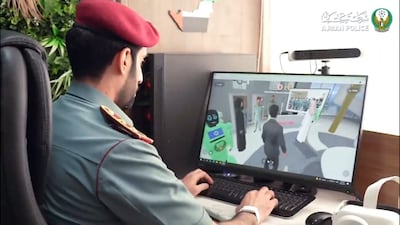A raft of UAE schools have brought in lessons in blockchain, cryptocurrencies and other emerging tech fields to prepare them for the job market of the future.
High on the the agenda will be making children fully aware of the possibilities ― and potential pitfalls ― of the metaverse.
The metaverse is envisaged as a new online world where someone with a 3D avatar, a representation of yourself, uses a virtual reality headset to go to concerts, work, socialise and access a range of services.
Citizens School
Gillian Hammond, principal at Repton Al Barsha, said promoting online safety was key.
“When they are exploring the metaverse, there are a lot of participants and we need to ensure our pupils are digital citizens and they know how to be safe online and understand the permanency of what they post online," Ms Hammond said.
"We've educated our pupils that things are not necessarily what they appear online, and that they must never share their names, pictures or location."
Ms Hammond said the school worked closely with parents to discuss what restrictions should be in place when children are online at home, using devices such as mobile phones, laptops and iPads.
While safety is key, the school is keen to embrace rapidly advancing technologies.
It is setting aside about an hour each week in the school timetable to explore game design, blockchain, learning about non-fungible tokens, widely known as NFTs, and the wider metaverse.
“As a family of schools, we have identified blockchain as the technology of the future and we really want to lead this space by raising awareness among our teachers, our parents and our pupils," Ms Hammond said.
“We want our pupils to understand and learn about blockchain and NFTs. We have had pupils in years four to six involved in game design.
“We deliver computer science lessons to all of our pupils. In fact, even from as early as Year 1, we start teaching children about computer science and coding.”
Last year, the school launched a digital passport for all pupils with the help of a blockchain provider.
Pupils all the way from FS1 to Year 13 will receive a digital record of their journey at school. Pupils could share their exam transcripts safely and these could be verified easily because documents would be dated.

The school has created a series of videos to educate the community about the benefits of blockchain and are running an extracurricular activity on blockchain and NFTs this year for all pupils who are interested and able to attend.
Schools look to the future
The UK curriculum Citizens School, in Dubai, claims to be the first in the Middle East to allow parents to pay school fees with cryptocurrencies. The school accepts payments in Bitcoin and Ether.
“We will ensure that our students have a digital mindset, that means understanding financial literacy, the world of cryptocurrency, NFTs, digital assets and blockchain," said principal Tracy Moxley.
“We do this through project-based learning and digital literacy classes ― complex concepts such as these will be explored in Year 5 and Year 6 and increase in complexity in secondary years.”
Mark Ryan, visual arts teacher in the primary years programme at Raha International School in Abu Dhabi, said he had been teaching his pupils how to take an artwork and make an NFT since last year.
For an exhibition last year, pupils were allowed to pick any topic that they would like to show and he said some of them were passionate about NFTs.
The digital tokens represent objects such as art, music and video games and are bought and sold online — often at a huge price — typically using cryptocurrency.
Pupils who made NFTs were encouraged not to focus on the currency and on buying and selling these, but simply studying how the digital space helped to track their work as young artists.
"These spaces are developing almost even faster than the curriculum itself," Mr Ryan said.
"We have a digital citizenship programme and the children learn about how to navigate the internet in general, and now with these emerging spaces, they do a lot of their social interactions online and we have tried to then have these discussions on safety."
Mr Ryan said this year he was working with pupils on robotics and on how to use digital spaces such as Sandbox, an Ethereum-based metaverse and gaming ecosystem, and Decentraland, a 3D virtual world browser-based platform.















